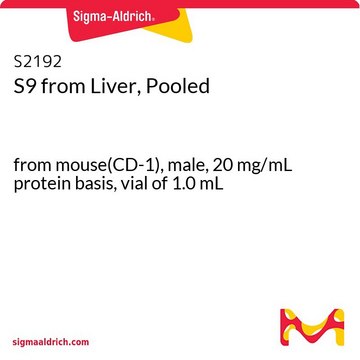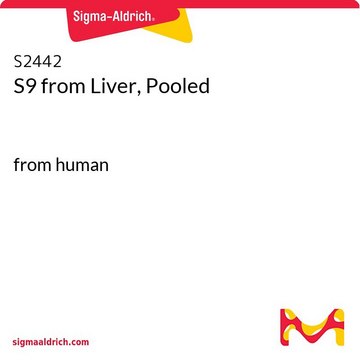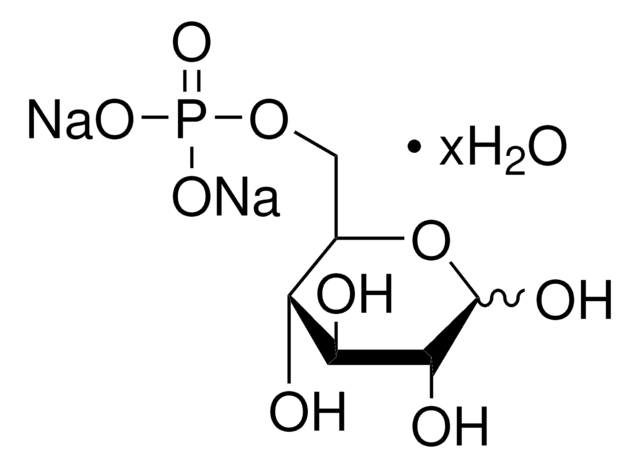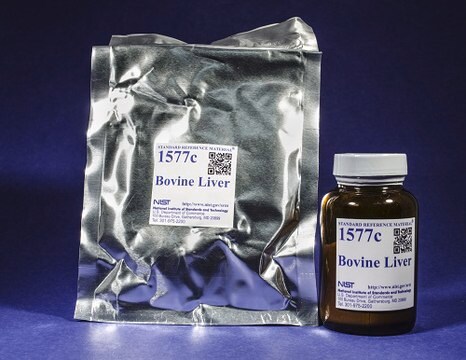S2067
S9 from Liver, Pooled
from rat(Sprague-Dawley), male
Synonym(s):
Liver S9 Fraction, S9 Liver Extract
Sign Into View Organizational & Contract Pricing
All Photos(1)
About This Item
UNSPSC Code:
12161501
NACRES:
NA.47
Recommended Products
biological source
rat (Sprague-Dawley)
Quality Level
packaging
vial of ~20 mg
UniProt accession no.
shipped in
dry ice
storage temp.
−70°C
Gene Information
rat ... Mrps9(301371)
Looking for similar products? Visit Product Comparison Guide
Application
S9 from Liver, Pooled has been used in metabolic activation in Salmonella typhimurium strains.
Biochem/physiol Actions
The hepatic S9 pools from a variety of biological sources represent the post-mitochondrial supernatant fraction from homogenized liver. Known to be a rich source of drug metabolizing enzymes including P-450, these pools are useful in the study of xenobiotic metabolism and drug interactions.
They are used in the Ames test, which is a method that uses bacteria to test if a given chemical causes mutations in the genetic material of a given test organism.
Storage Class Code
10 - Combustible liquids
WGK
WGK 2
Flash Point(F)
Not applicable
Flash Point(C)
Not applicable
Personal Protective Equipment
dust mask type N95 (US), Eyeshields, Gloves
Certificates of Analysis (COA)
Search for Certificates of Analysis (COA) by entering the products Lot/Batch Number. Lot and Batch Numbers can be found on a product’s label following the words ‘Lot’ or ‘Batch’.
Already Own This Product?
Find documentation for the products that you have recently purchased in the Document Library.
Customers Also Viewed
Genotoxicity evaluation of locally produced dental porcelain-An in vitro study using the Ames and Comet assays
Noushad M, et al.
Toxicology in vitro, 23(6), 1145-1150 (2009)
The Ames Salmonella/microsome mutagenicity assay.
Mortelman K and Zeiger E
Mutation Research, 455(1-2), 29-60 (2000)
An improvement of the Ames test using a modified human liver S9 preparation.
Hakura A
Journal of Pharmacological and Toxicological Methods, 46(3), 169-172 (2001)
Milena Lopes Francisco Bittencourt et al.
Life sciences, 256, 117977-117977 (2020-07-01)
Silibinin is the major component of flavonolignans complex mixture (Silymarin), which is obtained from Silybum marianum (L.) Gaertn. Despite several reports about silibinin, little is known about its effects on gastric diseases. Then, the present study aims to evaluate the
Leonara Fayer et al.
Toxicology research, 10(3), 511-522 (2021-06-19)
The titanium dioxide nanoparticles (NPs) have been applied to biomedical, pharmaceutical, and food additive fields. However, the effect on health and the environment are conflicting; thus, it has been reviewing several times. In this context, establishing standard robust protocols for
Our team of scientists has experience in all areas of research including Life Science, Material Science, Chemical Synthesis, Chromatography, Analytical and many others.
Contact Technical Service







